Abstract
Scrapie in sheep and goats is the best known of the transmissible encephalopathies of animals. The combination of maternal transmission of infection and long incubation periods effectively maintains the infection in flocks. A single sheep gene (Sip) controls both experimental and natural scrapie and the discovery of allelic markers could enable the use of sire selection in the control of the natural disease. Studies of experimental rodent scrapie show that neuroinvasion occurs by spread of infection from visceral lymphoreticular tissues along nerve fibers to mid-thoracic cord. The slowness of scrapie is due to restrictions on replication and cell-to-cell spread of infection affecting neuroinvasion and subsequent neuropathogenesis. Probably both stages in mice are controlled by Sinc gene, the murine equivalent of Sip. The glycoprotein PrP may be the normal product of Sinc gene. Posttranslationally modified PrP forms the disease specific "scrapie associated fibrils" and may also be a constituent of the infectious agent. Scrapie-like diseases have been reported in mink and several species of ruminants including cattle. All of them may be caused by the recycling of scrapie infected sheep material in animal feed. The human health implications are discussed.
Full text
PDF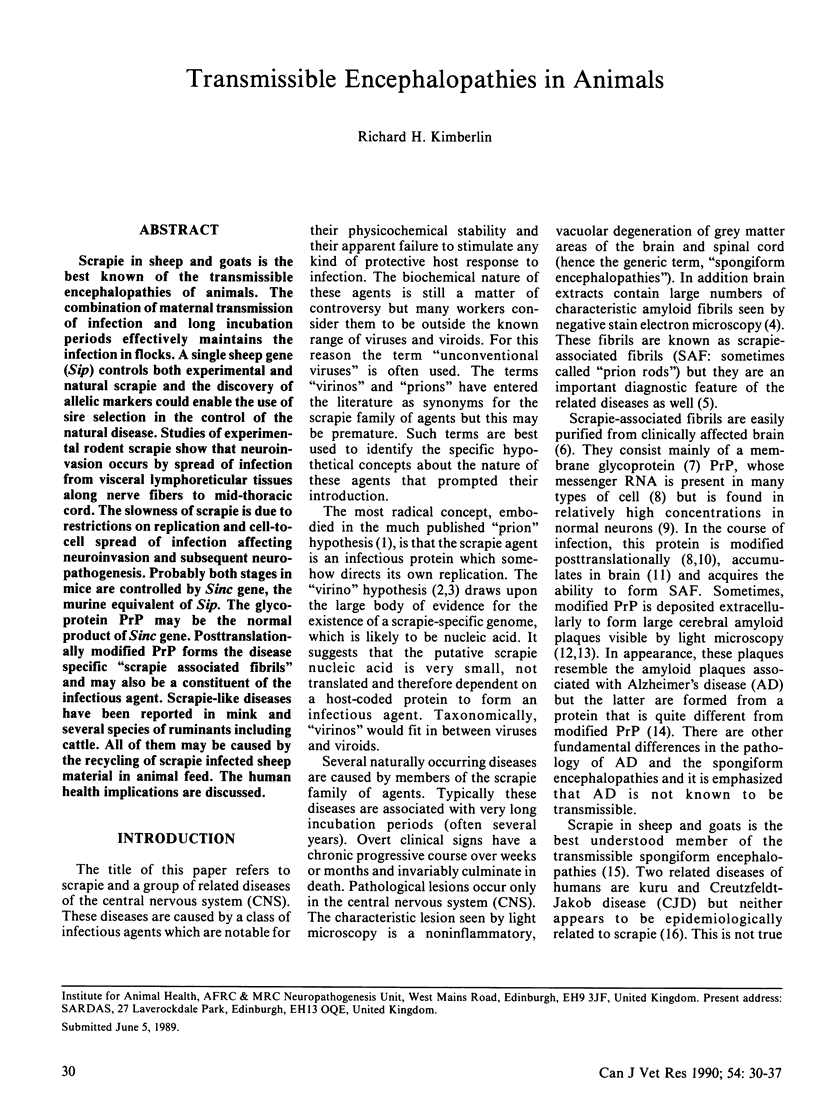
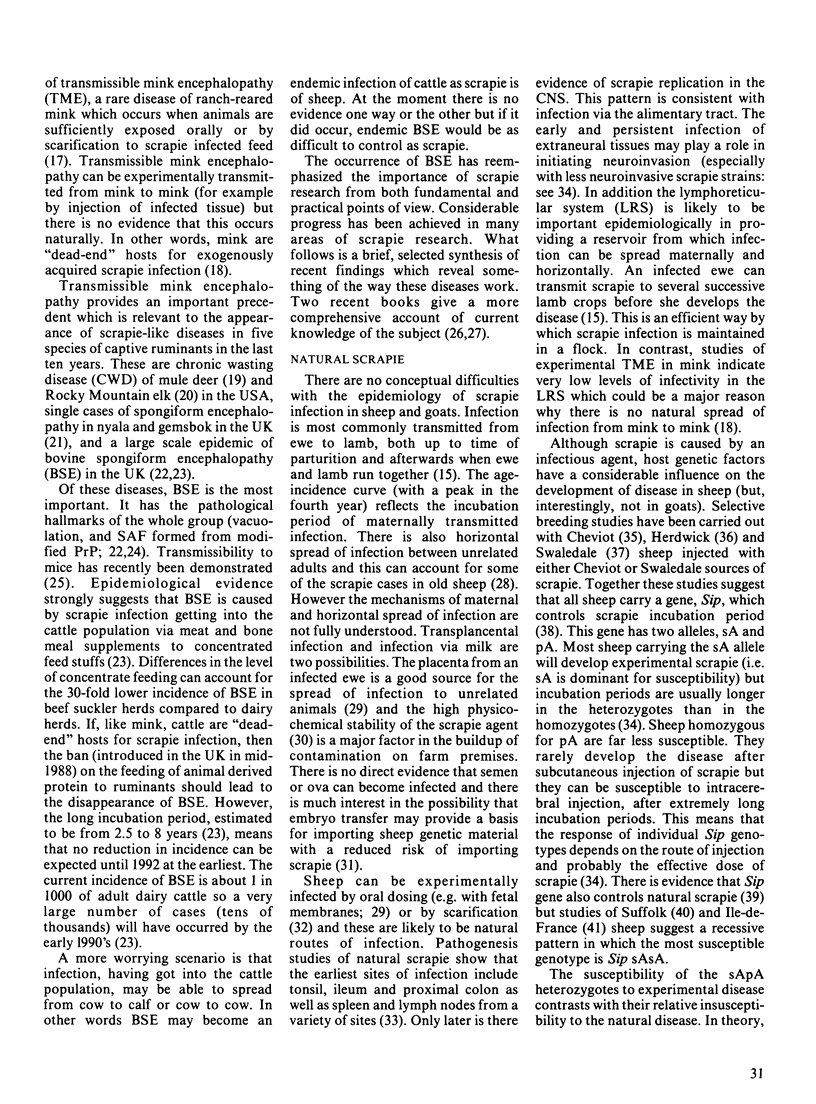
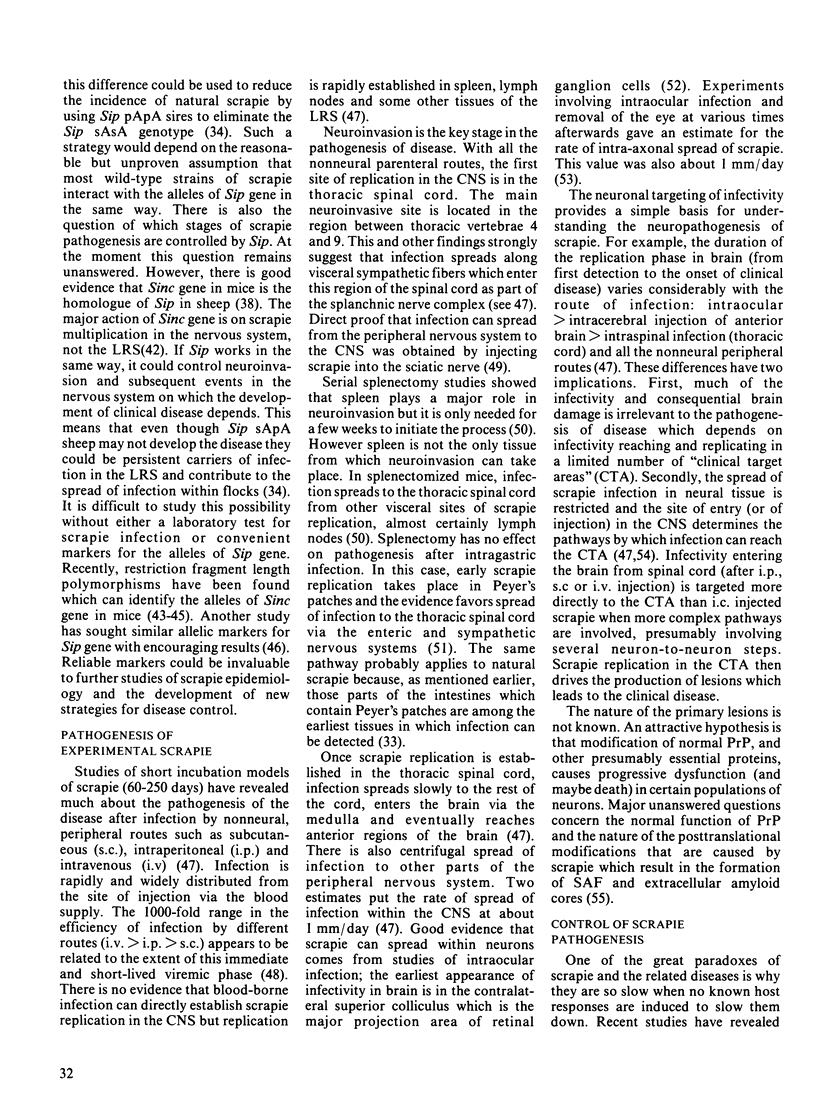
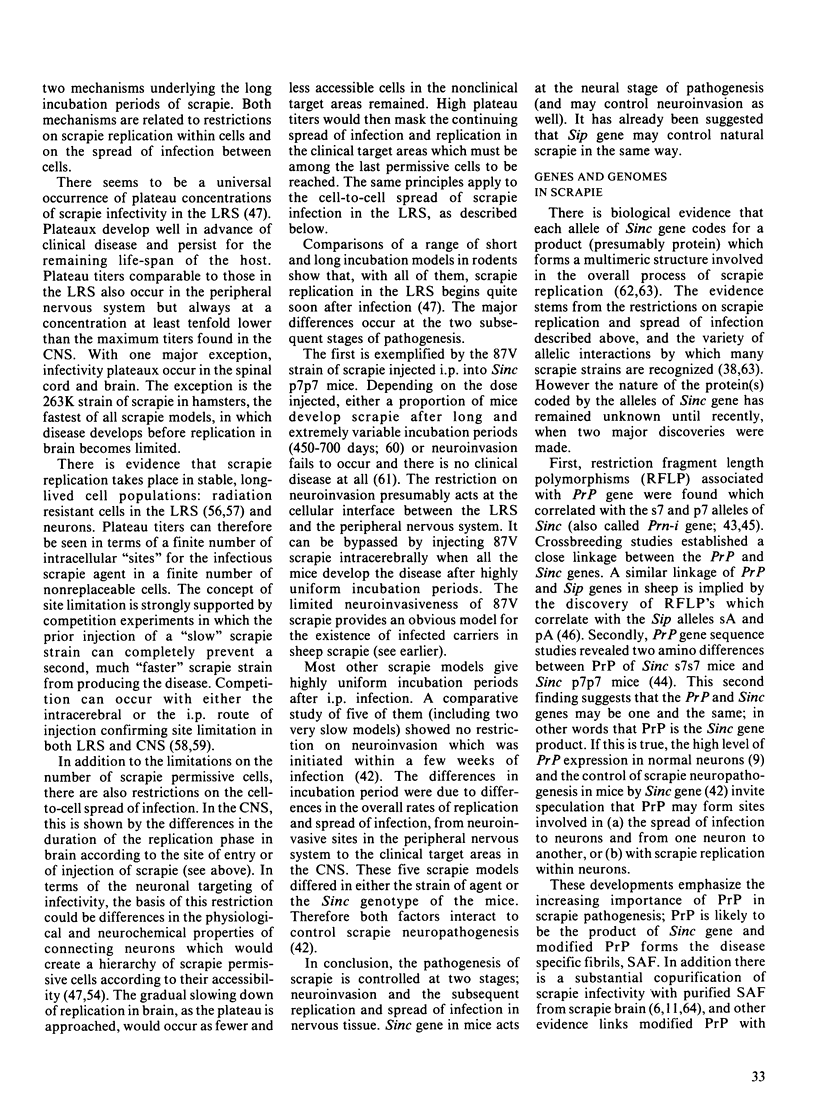
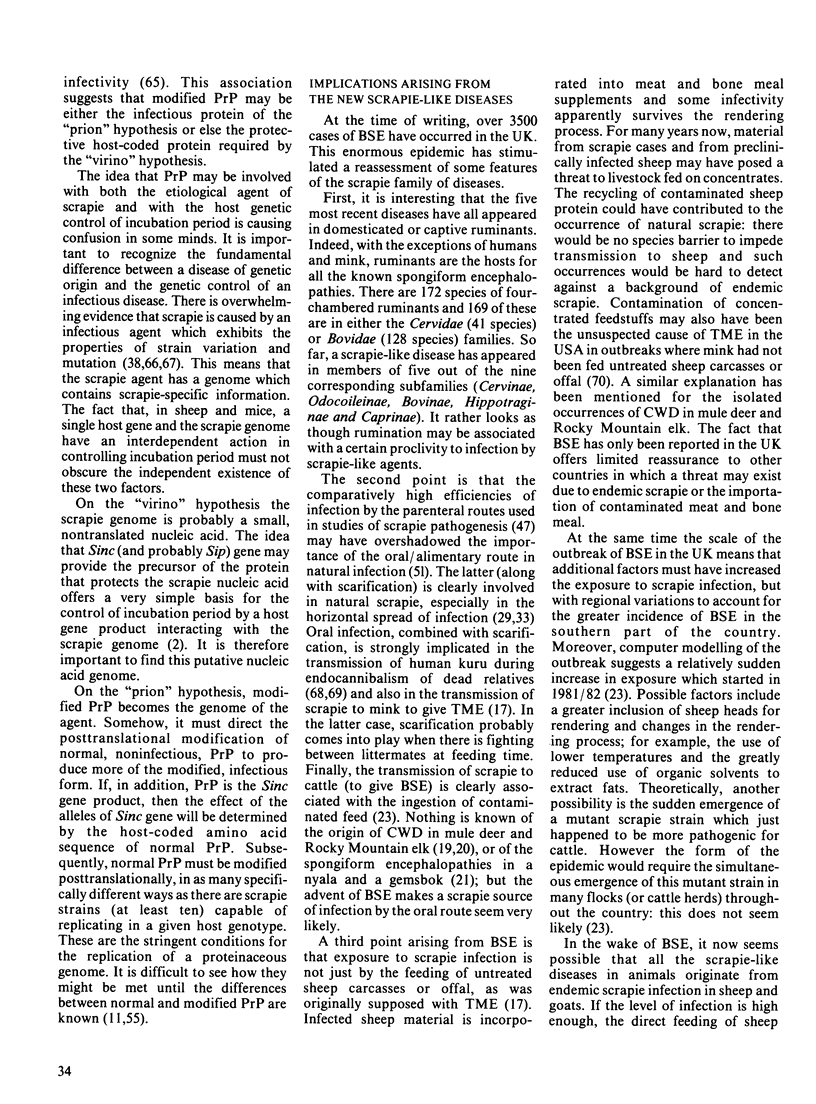
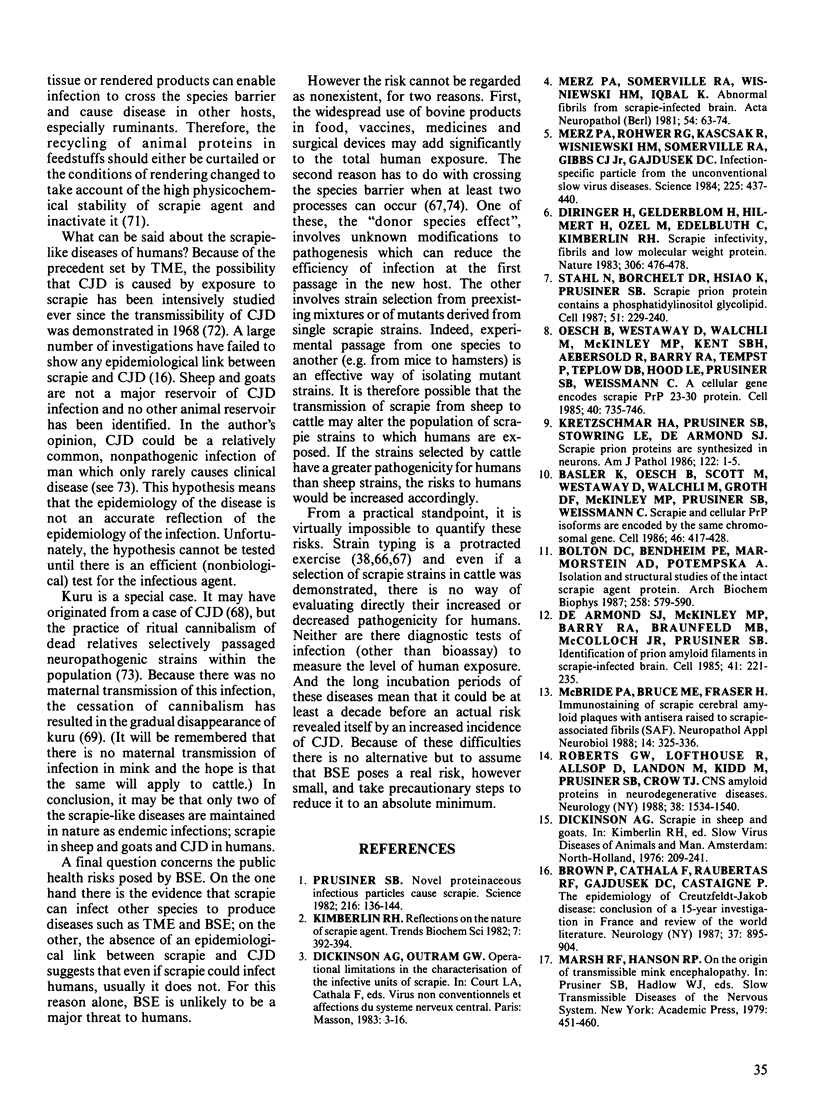
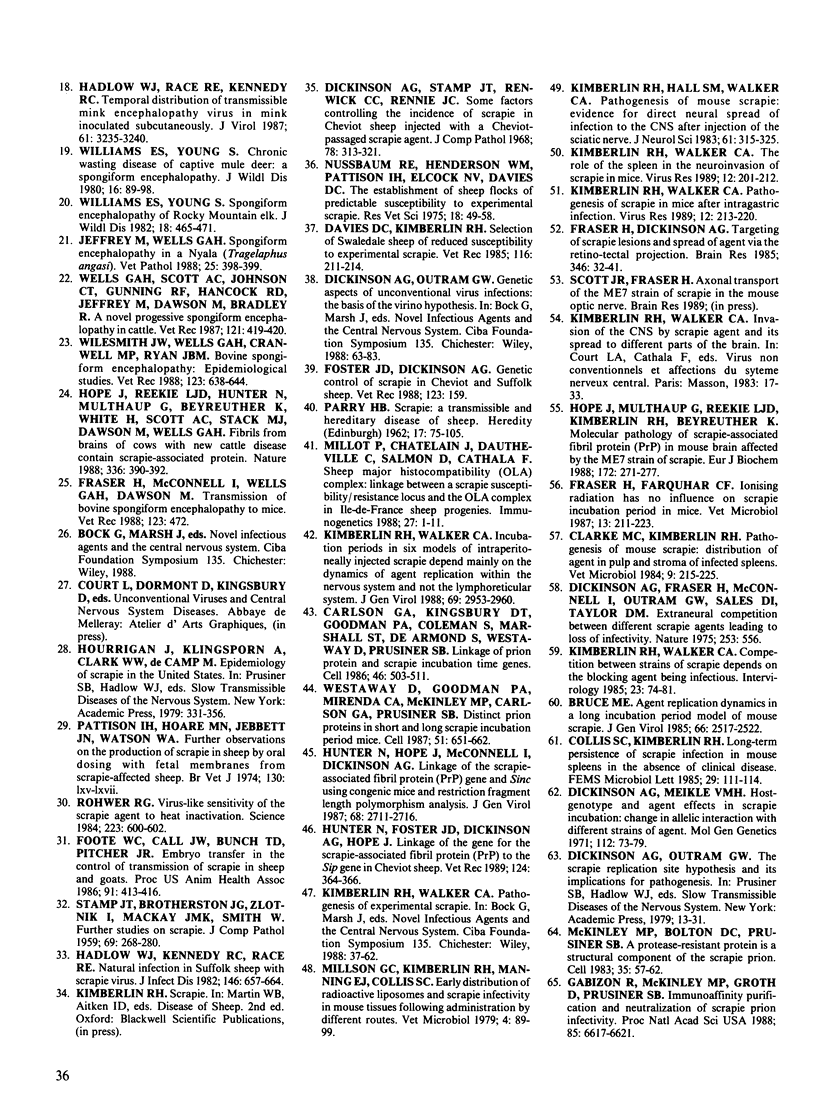
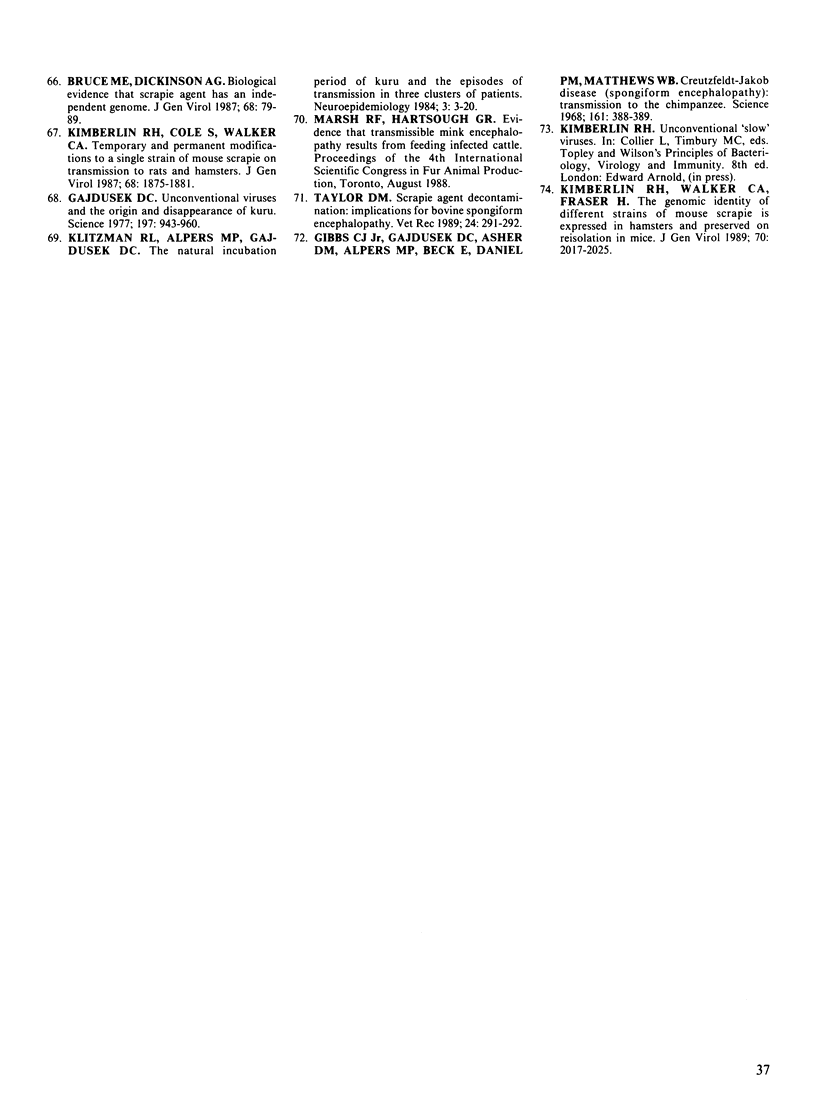
Selected References
These references are in PubMed. This may not be the complete list of references from this article.
- Basler K., Oesch B., Scott M., Westaway D., Wälchli M., Groth D. F., McKinley M. P., Prusiner S. B., Weissmann C. Scrapie and cellular PrP isoforms are encoded by the same chromosomal gene. Cell. 1986 Aug 1;46(3):417–428. doi: 10.1016/0092-8674(86)90662-8. [DOI] [PubMed] [Google Scholar]
- Bolton D. C., Bendheim P. E., Marmorstein A. D., Potempska A. Isolation and structural studies of the intact scrapie agent protein. Arch Biochem Biophys. 1987 Nov 1;258(2):579–590. doi: 10.1016/0003-9861(87)90380-8. [DOI] [PubMed] [Google Scholar]
- Brown P., Cathala F., Raubertas R. F., Gajdusek D. C., Castaigne P. The epidemiology of Creutzfeldt-Jakob disease: conclusion of a 15-year investigation in France and review of the world literature. Neurology. 1987 Jun;37(6):895–904. doi: 10.1212/wnl.37.6.895. [DOI] [PubMed] [Google Scholar]
- Bruce M. E. Agent replication dynamics in a long incubation period model of mouse scrapie. J Gen Virol. 1985 Dec;66(Pt 12):2517–2522. doi: 10.1099/0022-1317-66-12-2517. [DOI] [PubMed] [Google Scholar]
- Bruce M. E., Dickinson A. G. Biological evidence that scrapie agent has an independent genome. J Gen Virol. 1987 Jan;68(Pt 1):79–89. doi: 10.1099/0022-1317-68-1-79. [DOI] [PubMed] [Google Scholar]
- Carlson G. A., Kingsbury D. T., Goodman P. A., Coleman S., Marshall S. T., DeArmond S., Westaway D., Prusiner S. B. Linkage of prion protein and scrapie incubation time genes. Cell. 1986 Aug 15;46(4):503–511. doi: 10.1016/0092-8674(86)90875-5. [DOI] [PubMed] [Google Scholar]
- Clarke M. C., Kimberlin R. H. Pathogenesis of mouse scrapie: distribution of agent in the pulp and stroma of infected spleens. Vet Microbiol. 1984 Jul;9(3):215–225. doi: 10.1016/0378-1135(84)90039-7. [DOI] [PubMed] [Google Scholar]
- Davies D. C., Kimberlin R. H. Selection of Swaledale sheep of reduced susceptibility to experimental scrapie. Vet Rec. 1985 Feb 23;116(8):211–214. doi: 10.1136/vr.116.8.211. [DOI] [PubMed] [Google Scholar]
- DeArmond S. J., McKinley M. P., Barry R. A., Braunfeld M. B., McColloch J. R., Prusiner S. B. Identification of prion amyloid filaments in scrapie-infected brain. Cell. 1985 May;41(1):221–235. doi: 10.1016/0092-8674(85)90076-5. [DOI] [PubMed] [Google Scholar]
- Dickinson A. G., Meikle V. M. Host-genotype and agent effects in scrapie incubation: change in allelic interaction with different strains of agent. Mol Gen Genet. 1971;112(1):73–79. doi: 10.1007/BF00266934. [DOI] [PubMed] [Google Scholar]
- Dickinson A. G., Stamp J. T., Renwick C. C., Rennie J. C. Some factors controlling the incidence of scrapie in Cheviot sheep injected with a Cheviot-passaged scrapie agent. J Comp Pathol. 1968 Jul;78(3):313–321. doi: 10.1016/0021-9975(68)90007-8. [DOI] [PubMed] [Google Scholar]
- Diringer H., Gelderblom H., Hilmert H., Ozel M., Edelbluth C., Kimberlin R. H. Scrapie infectivity, fibrils and low molecular weight protein. Nature. 1983 Dec 1;306(5942):476–478. doi: 10.1038/306476a0. [DOI] [PubMed] [Google Scholar]
- Foster J. D., Dickinson A. G. Genetic control of scrapie in Cheviot and Suffolk sheep. Vet Rec. 1988 Aug 6;123(6):159–159. doi: 10.1136/vr.123.6.159. [DOI] [PubMed] [Google Scholar]
- Fraser H., Dickinson A. G. Targeting of scrapie lesions and spread of agent via the retino-tectal projection. Brain Res. 1985 Oct 28;346(1):32–41. doi: 10.1016/0006-8993(85)91091-1. [DOI] [PubMed] [Google Scholar]
- Fraser H., Farquhar C. F. Ionising radiation has no influence on scrapie incubation period in mice. Vet Microbiol. 1987 Mar;13(3):211–223. doi: 10.1016/0378-1135(87)90084-8. [DOI] [PubMed] [Google Scholar]
- Fraser H., McConnell I., Wells G. A., Dawson M. Transmission of bovine spongiform encephalopathy to mice. Vet Rec. 1988 Oct 29;123(18):472–472. doi: 10.1136/vr.123.18.472. [DOI] [PubMed] [Google Scholar]
- Gabizon R., McKinley M. P., Groth D., Prusiner S. B. Immunoaffinity purification and neutralization of scrapie prion infectivity. Proc Natl Acad Sci U S A. 1988 Sep;85(18):6617–6621. doi: 10.1073/pnas.85.18.6617. [DOI] [PMC free article] [PubMed] [Google Scholar]
- Gajdusek D. C. Unconventional viruses and the origin and disappearance of kuru. Science. 1977 Sep 2;197(4307):943–960. doi: 10.1126/science.142303. [DOI] [PubMed] [Google Scholar]
- Gibbs C. J., Jr, Gajdusek D. C., Asher D. M., Alpers M. P., Beck E., Daniel P. M., Matthews W. B. Creutzfeldt-Jakob disease (spongiform encephalopathy): transmission to the chimpanzee. Science. 1968 Jul 26;161(3839):388–389. doi: 10.1126/science.161.3839.388. [DOI] [PubMed] [Google Scholar]
- Hadlow W. J., Kennedy R. C., Race R. E. Natural infection of Suffolk sheep with scrapie virus. J Infect Dis. 1982 Nov;146(5):657–664. doi: 10.1093/infdis/146.5.657. [DOI] [PubMed] [Google Scholar]
- Hadlow W. J., Race R. E., Kennedy R. C. Temporal distribution of transmissible mink encephalopathy virus in mink inoculated subcutaneously. J Virol. 1987 Oct;61(10):3235–3240. doi: 10.1128/jvi.61.10.3235-3240.1987. [DOI] [PMC free article] [PubMed] [Google Scholar]
- Hope J., Multhaup G., Reekie L. J., Kimberlin R. H., Beyreuther K. Molecular pathology of scrapie-associated fibril protein (PrP) in mouse brain affected by the ME7 strain of scrapie. Eur J Biochem. 1988 Mar 1;172(2):271–277. doi: 10.1111/j.1432-1033.1988.tb13883.x. [DOI] [PubMed] [Google Scholar]
- Hope J., Reekie L. J., Hunter N., Multhaup G., Beyreuther K., White H., Scott A. C., Stack M. J., Dawson M., Wells G. A. Fibrils from brains of cows with new cattle disease contain scrapie-associated protein. Nature. 1988 Nov 24;336(6197):390–392. doi: 10.1038/336390a0. [DOI] [PubMed] [Google Scholar]
- Hunter N., Foster J. D., Dickinson A. G., Hope J. Linkage of the gene for the scrapie-associated fibril protein (PrP) to the Sip gene in Cheviot sheep. Vet Rec. 1989 Apr 8;124(14):364–366. doi: 10.1136/vr.124.14.364. [DOI] [PubMed] [Google Scholar]
- Hunter N., Hope J., McConnell I., Dickinson A. G. Linkage of the scrapie-associated fibril protein (PrP) gene and Sinc using congenic mice and restriction fragment length polymorphism analysis. J Gen Virol. 1987 Oct;68(Pt 10):2711–2716. doi: 10.1099/0022-1317-68-10-2711. [DOI] [PubMed] [Google Scholar]
- Jeffrey M., Wells G. A. Spongiform encephalopathy in a nyala (Tragelaphus angasi). Vet Pathol. 1988 Sep;25(5):398–399. doi: 10.1177/030098588802500514. [DOI] [PubMed] [Google Scholar]
- Kimberlin R. H., Cole S., Walker C. A. Temporary and permanent modifications to a single strain of mouse scrapie on transmission to rats and hamsters. J Gen Virol. 1987 Jul;68(Pt 7):1875–1881. doi: 10.1099/0022-1317-68-7-1875. [DOI] [PubMed] [Google Scholar]
- Kimberlin R. H., Hall S. M., Walker C. A. Pathogenesis of mouse scrapie. Evidence for direct neural spread of infection to the CNS after injection of sciatic nerve. J Neurol Sci. 1983 Oct-Nov;61(3):315–325. doi: 10.1016/0022-510x(83)90165-x. [DOI] [PubMed] [Google Scholar]
- Kimberlin R. H., Walker C. A. Competition between strains of scrapie depends on the blocking agent being infectious. Intervirology. 1985;23(2):74–81. doi: 10.1159/000149588. [DOI] [PubMed] [Google Scholar]
- Kimberlin R. H., Walker C. A., Fraser H. The genomic identity of different strains of mouse scrapie is expressed in hamsters and preserved on reisolation in mice. J Gen Virol. 1989 Aug;70(Pt 8):2017–2025. doi: 10.1099/0022-1317-70-8-2017. [DOI] [PubMed] [Google Scholar]
- Kimberlin R. H., Walker C. A. Incubation periods in six models of intraperitoneally injected scrapie depend mainly on the dynamics of agent replication within the nervous system and not the lymphoreticular system. J Gen Virol. 1988 Dec;69(Pt 12):2953–2960. doi: 10.1099/0022-1317-69-12-2953. [DOI] [PubMed] [Google Scholar]
- Kimberlin R. H., Walker C. A. Pathogenesis of scrapie in mice after intragastric infection. Virus Res. 1989 Mar;12(3):213–220. doi: 10.1016/0168-1702(89)90040-3. [DOI] [PubMed] [Google Scholar]
- Kimberlin R. H., Walker C. A. The role of the spleen in the neuroinvasion of scrapie in mice. Virus Res. 1989 Mar;12(3):201–211. doi: 10.1016/0168-1702(89)90039-7. [DOI] [PubMed] [Google Scholar]
- Kretzschmar H. A., Prusiner S. B., Stowring L. E., DeArmond S. J. Scrapie prion proteins are synthesized in neurons. Am J Pathol. 1986 Jan;122(1):1–5. [PMC free article] [PubMed] [Google Scholar]
- McBride P. A., Bruce M. E., Fraser H. Immunostaining of scrapie cerebral amyloid plaques with antisera raised to scrapie-associated fibrils (SAF). Neuropathol Appl Neurobiol. 1988 Jul-Aug;14(4):325–336. doi: 10.1111/j.1365-2990.1988.tb00892.x. [DOI] [PubMed] [Google Scholar]
- McKinley M. P., Bolton D. C., Prusiner S. B. A protease-resistant protein is a structural component of the scrapie prion. Cell. 1983 Nov;35(1):57–62. doi: 10.1016/0092-8674(83)90207-6. [DOI] [PubMed] [Google Scholar]
- Merz P. A., Rohwer R. G., Kascsak R., Wisniewski H. M., Somerville R. A., Gibbs C. J., Jr, Gajdusek D. C. Infection-specific particle from the unconventional slow virus diseases. Science. 1984 Jul 27;225(4660):437–440. doi: 10.1126/science.6377496. [DOI] [PubMed] [Google Scholar]
- Merz P. A., Somerville R. A., Wisniewski H. M., Iqbal K. Abnormal fibrils from scrapie-infected brain. Acta Neuropathol. 1981;54(1):63–74. doi: 10.1007/BF00691333. [DOI] [PubMed] [Google Scholar]
- Millot P., Chatelain J., Dautheville C., Salmon D., Cathala F. Sheep major histocompatibility (OLA) complex: linkage between a scrapie susceptibility/resistance locus and the OLA complex in Ile-de-France sheep progenies. Immunogenetics. 1988;27(1):1–11. doi: 10.1007/BF00404437. [DOI] [PubMed] [Google Scholar]
- Nussbaum R. E., Henderson W. M., Pattison I. H., Elcock N. V., Davies D. C. The establishment of sheep flocks of predictable susceptibility to expirimental scrapie. Res Vet Sci. 1975 Jan;18(1):49–58. [PubMed] [Google Scholar]
- Oesch B., Westaway D., Wälchli M., McKinley M. P., Kent S. B., Aebersold R., Barry R. A., Tempst P., Teplow D. B., Hood L. E. A cellular gene encodes scrapie PrP 27-30 protein. Cell. 1985 Apr;40(4):735–746. doi: 10.1016/0092-8674(85)90333-2. [DOI] [PubMed] [Google Scholar]
- PARRY H. B. Scrapie: a transmissible and hereditary disease of sheep. Heredity (Edinb) 1962 Feb;17:75–105. doi: 10.1038/hdy.1962.4. [DOI] [PubMed] [Google Scholar]
- Prusiner S. B. Novel proteinaceous infectious particles cause scrapie. Science. 1982 Apr 9;216(4542):136–144. doi: 10.1126/science.6801762. [DOI] [PubMed] [Google Scholar]
- Roberts G. W., Lofthouse R., Allsop D., Landon M., Kidd M., Prusiner S. B., Crow T. J. CNS amyloid proteins in neurodegenerative diseases. Neurology. 1988 Oct;38(10):1534–1540. doi: 10.1212/wnl.38.10.1534. [DOI] [PubMed] [Google Scholar]
- Rohwer R. G. Virus like sensitivity of the scrapie agent to heat inactivation. Science. 1984 Feb 10;223(4636):600–602. doi: 10.1126/science.6420887. [DOI] [PubMed] [Google Scholar]
- STAMP J. T., BROTHERSTON J. G., ZLOTNIK I., MACKAY J. M., SMITH W. Further studies on scrapie. J Comp Pathol. 1959 Jul;69:268–280. doi: 10.1016/s0368-1742(59)80026-6. [DOI] [PubMed] [Google Scholar]
- Stahl N., Borchelt D. R., Hsiao K., Prusiner S. B. Scrapie prion protein contains a phosphatidylinositol glycolipid. Cell. 1987 Oct 23;51(2):229–240. doi: 10.1016/0092-8674(87)90150-4. [DOI] [PubMed] [Google Scholar]
- Taylor D. M. Scrapie agent decontamination: implications for bovine spongiform encephalopathy. Vet Rec. 1989 Mar 25;124(12):291–292. doi: 10.1136/vr.124.12.291. [DOI] [PubMed] [Google Scholar]
- Wells G. A., Scott A. C., Johnson C. T., Gunning R. F., Hancock R. D., Jeffrey M., Dawson M., Bradley R. A novel progressive spongiform encephalopathy in cattle. Vet Rec. 1987 Oct 31;121(18):419–420. doi: 10.1136/vr.121.18.419. [DOI] [PubMed] [Google Scholar]
- Westaway D., Goodman P. A., Mirenda C. A., McKinley M. P., Carlson G. A., Prusiner S. B. Distinct prion proteins in short and long scrapie incubation period mice. Cell. 1987 Nov 20;51(4):651–662. doi: 10.1016/0092-8674(87)90134-6. [DOI] [PubMed] [Google Scholar]
- Wilesmith J. W., Wells G. A., Cranwell M. P., Ryan J. B. Bovine spongiform encephalopathy: epidemiological studies. Vet Rec. 1988 Dec 17;123(25):638–644. [PubMed] [Google Scholar]
- Williams E. S., Young S. Chronic wasting disease of captive mule deer: a spongiform encephalopathy. J Wildl Dis. 1980 Jan;16(1):89–98. doi: 10.7589/0090-3558-16.1.89. [DOI] [PubMed] [Google Scholar]
- Williams E. S., Young S. Spongiform encephalopathy of Rocky Mountain elk. J Wildl Dis. 1982 Oct;18(4):465–471. doi: 10.7589/0090-3558-18.4.465. [DOI] [PubMed] [Google Scholar]


